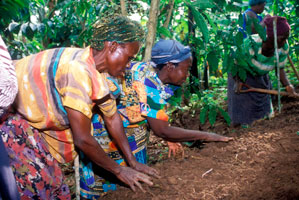
Tree planting is key. Forests have potential to mitigate some of the impacts of climate change like drought, floods and landslides.
Credits: Nicholson/Caritas
Uganda is already experiencing out of season flooding in the eastern region which destroyed crops and spread disease, heat waves, reduction in water levels, unpredictable rain, and prolonged drought in many parts of the country.
There is reduced agricultural productivity, leading to increased food prices, food insecurity, and hunger. The 2009 State of Uganda Population Report states that 40 percent of deaths among children are due to malnutrition.
Over 90 percent of Uganda depends on wood for domestic cooking, so the problem of wood scarcity is already alarming. With Uganda’s increasing human population at 3.6 percent a year (UBOS, 2004) and continued deforestation (200,000 ha per year), the situation is likely to get worse.
Tree planting is key. Apart from the trees themselves, there is great potential for income generation by poor communities. Forests have potential to mitigate some of the impacts of climate change like drought, floods and landslides.
Appreciation of the environment in communities as part of their livelihoods and supporting them with technical knowledge and planting materials is lacking. The majority of the people living in rural areas are illiterate and lack information on commercial activities.
The government of Uganda has prepared a National Adaptation Plan of Action, which sets out plans to increase awareness of climate change in local communities and invest in technology to enable better long term weather forecasting. These efforts are not enough. More stakeholders like the churches need to step in and further support the government.
Caritas Uganda is involved in the establishment of community tree nurseries, tree planting, and education campaigns through the media, such as on radio talk shows. Caritas also promotes soil and water conservation, alternative livelihood means such as bee keeping, fish farming, and the use of biogas and solar energy.
Caritas plans to scale up its activities. The proposed interventions are tree planting by communities in each parish of the nineteen Catholic dioceses of Uganda, as well as capacity building in income generating activities and awareness creation of climate change.
The expected benefits are greater awareness by the communities on causes, impacts and mitigation measures, increased capacity of communities to read and make use of early warning signs, increased ability to get organised as tree planting cooperatives, and increased ability of the communities to become ‘Environmental Auditors’.
Caritas proposes to increase public education, training in both schools and the community and public awareness raising. Communities will be encouraged to understand the importance of the global climate and improve their coping strategies.
